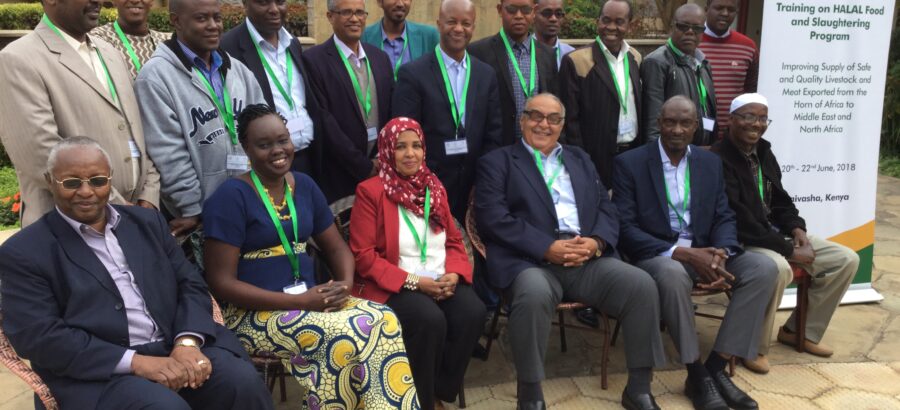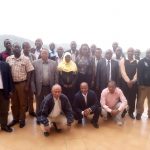IGAD and FAO have been implementing a regional project; improving supply of safe and quality livestock and meat exported from the Horn of Africa to Middle East and North African Countries funded by Italian Development cooperation. The project has been supporting export of live animals and meat from IGAD member states to Middle East and North Africa and alternative markets in South East Asia and West Africa. One of the key requirement to access and expand the market is to comply with the Halal slaughter. Hence training of the relevant bodies on Halal slaughter was organized by ICPALD for a three days training in Naivasha, Kenya from 21-22nd June, 2018 in collaboration with the Emirates International Accreditation Center (EIAC)
The trainees were veterinary officers under the Chief Veterinary Officer’s directly supervising and supporting export slaughterhouses and from the Islamic Halal body or Bureau of Halal Certification from Djibouti, Ethiopia, Kenya, Somalia, South Sudan, Sudan and Uganda. A total of 16 participants were trained.
Dr. Solomon Munyua, the Director of ICPALD encouraged the trainees to pay keen attention so as to serve as (trainer of trainers) ToTs once they went back to their respective countries. Dr. Lawrence Gateru on behalf of the CVO, Kenya expressed appreciation for IGAD/ICPALD for organizing such a training. He also emphasized that halal slaughter promotes efforts towards maintaining good animal welfare and human health since it ensures processing of quality and safe meat for local consumption and export trade. The following recommendations were made:
- The public sector trainees will serve as TOTs to train meat inspectors and halal slaughterers stationed in export and local slaughterhouses in their countries to attain a critical mass;
- The trainees together with national staff operating animal welfare organizations, private sector and development partners should focus on promoting good animal welfare practices along the value chain- market, transportation, holding pens and during slaughter process;
- Member states should advocate the importance of good animal welfare practices as a complementary service alongside animal production, disease control services and access to markets so as to attract national budget allocation to support awareness creation through development of banners, website adverts, convene stakeholders forums etc;
- The public sector should closely work with the private sector to implement regulations supporting promotion of animal welfare practices;
- ICPALD should work on South to South training and field learning experience in promotion of halal slaughter as well as improvement of animal welfare practices;
- Future trainings will be based on demonstrable use of the present training for consistency and will have practical sessions at halal compliant slaughter facilities;
- Ethiopia, Kenya, Sudan and Somalia should roll out the national animal welfare strategies while IGAD or the member states (Djibouti; South Sudan and Uganda ) should endeavor to develop national animal welfare strategy aligned to the IGAD regional strategy.
IGAD/ICPALD acknowledges and appreciates the Italian Development Cooperation for financing the event through the IGAD /FAO implemented livestock and meat project.






